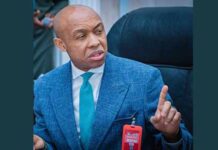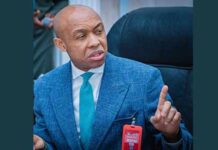Recently, the National Assembly set up two separate Committees to undertake a review of the Constitution of the Federal Republic of Nigeria 1999 (As Amended).
Whilst the Senate has 45 members in its Committee led by the Deputy Senate President, the House of Representatives has 47 members in its own Committee led by the Deputy Speaker of the House.
These Committees are expected to look into provisions relating to the Nigeria Police and the Nigerian security system, State creation, devolution of powers, judicial reforms, socio-economic rights, electoral reforms, etc.
Since the advent of our democratic administrations following the exit of the military in 1999, Nigeria has attempted constitutional amendments five times, mostly ending up as some kind of jamboree to find money for the boys.
The National Assembly under Senator Bukola Saraki made some efforts with some token alterations of the Constitution in very inconsequential ways.
The current exercise should be a marked departure from previous experiences.
To support the amendment of the Constitution, grants are secured from donor agencies abroad, in addition to votes of not less than one billion Naira on every occasion.
According to the learned authors of Black’s Law Dictionary, an amendment is ‘a formal revision or addition proposed or made to a statute, constitution or other instrument’. In this regard, to amend is ‘to make right, to correct or rectify’; it can also mean ‘to change the wording of, to alter (a statute, constitution, etc.) formally by adding or deleting a provision or by modifying the wording’.
Under and by virtue of sections 4 (1) & (2) of the Constitution:
(1) “The legislative powers of the Federal Republic of Nigeria shall be vested in a National Assembly for the Federation which shall consist of a Senate and a House of Representatives.
(2) The National Assembly shall have power to make laws for the peace, order and good government of the Federation or any part thereof with respect to any matter included in the Exclusive Legislative List set out in Part 1 of the Second Schedule to this Constitution.”
There have been concerns expressed over the nature and effect of this document on our nationhood.
Thus, over the years, virtually every legislative arm has attempted to amend the Constitution as a way of placating the people of Nigeria whose input was not sought or obtained by the military before it was forced on them.
Section 9 of the said Constitution deals with the detailed procedure for the amendment of the Constitution. It is rather cumbersome and laborious. Let me dwell on the process of amendment of the Constitution a little more in detail as adopted from Policy and Legal Advocacy Centre.
1. Proposed amendment to the Constitution usually comes by way of Bills, which originate either from the Executive or a Member of the National Assembly as a Private Member Bill. While Executive Bills are initiated by the President, the Chief Justice of Nigeria or other Government officials, Private Member’s Bills are initiated by interest groups and sponsored by members of either the Senate or the House of Representatives.
2. The National Assembly may organise a public hearing and other consultations on the bill.
3. The amendment proposals are presented as one Constitution Amendment Bill or as several Bills touching on different subject matters in a report to plenary. The 8th Assembly for instance, adopted a piecemeal approach where constitutional amendment proposals were brought as separate bills rather than a single Constitutional Amendment Bill. This was done to avoid the 7th Assembly’s experience with presenting multiple proposals in a single amendment bill, which were all jettisoned when the President refused to sign the bill. If the report and bill(s) as presented is adopted at this stage, it progresses to Third Reading. Before the Bill progresses to Third Reading, every member of the legislature votes either in support or against each specific item in the Bill. Here, the proposals to the Constitution are often presented in the form of a clause. A two third majority of all the members of each House is needed for each clause to be deemed as passed except where the proposal borders on the creation of new states, boundary adjustments, new local government areas, fundamental rights and on the mode for altering the Constitution. In such cases, a four-fifth majority is needed.
4. The Votes are then collated and counted, usually after electronic voting. The reason for this is two fold. Firstly, it is to ensure that the total number of Senators or House of Representatives Members in attendance are not below the minimum number required to pass a proposed clause. Secondly, this is to ensure that any proposal that is passed meets the stipulated requirement of an approval by a two-third majority. Once two-thirds of the total number of Senators or Members voting in each chamber is achieved in any of the proposals of the Committee, the process moves to the next stage.
5. If an amendment occurs at either of the Houses on the bill or each House passes the bill with differences, a Conference Committee will be set up to harmonise the differences. This is because the two chambers are required to pass every bill, including constitution amendment bills in identical format. If both Houses are not able to harmonise positions, the Bill will be returned to the respective chambers of the National Assembly for fresh voting. Two-thirds of the numerical strength of each House will still be required to pass it at this stage. This would mean a minimum of seventy-two Senators and two hundred and forty Members of the House adopting an identical bill for transmission to the States. Where the bill is however adopted or passed in identical format by the two chambers i.e. without amendments, there would be no need for a conference or harmonization as described above as it is deemed that they have passed a single uniform bill. The bill is then transmitted to the State Houses of Assembly by the Clerk of the National Assembly for their concurrence.
6. A simple majority vote of members in 24 States will be required for each amendment to be approved. This is usually in the form of a YES or NO vote. Note: In practice, State Assemblies have been known to “step down” or “defer” a bill they are unable to decide on instead of voting “No.” This still does not translate to a “Yes” vote.
7. When two-thirds of the States approve each clause by simple majority, returns are then made to the National Assembly after which it is adopted (usually in a ceremony) by the National Assembly before its transmittal to the President for assent. The Clerk of the National Assembly is expected to attach the Votes and Proceedings of the National Assembly and the State Houses of Assembly to show that the amendments meet the constitutional requirement for passage.
8. Note that some legislative experts argue that once the States approve the amendments, they should automatically come into effect as the Constitution does not expressly prescribe the requirement of the President’s Assent for constitution amendment bills. Further, in a Federal system, when the States have ratified an amendment, it should be seen as the final and authoritative will of the people.
9. The end of the Assembly of every legislative house breaks the cycle of the amendment process. Therefore, the Constitution amendment process cannot go beyond the fixed period stipulated for any given Assembly nor deliberations on the amendments continue at the convening of a new Assembly.
Just exactly how does one go about amending a document such as the Nigerian Constitution, filled with manifest inconsistencies and fallacies, creating a supposed federation governed in unitary style?
I generally believe that the issue is beyond mere amendments, given the nature of our peculiarities as a nation.
But the tokenism of the current exercise may birth some optimism different from the previous ones principally because of the personalities involved, even though I am well aware of the fact that politicians have their ways.
Furthermore, one of the arrowheads of previous amendments is now at the seat of power, being the former Speaker of the House and now Chief of Staff to the President, who should facilitate the cooperation of the President and the Governors to achieve a successful exercise.
The Committees should leverage on the drafts put together by their colleagues since 2003, hire lawyers who are experts in this area and collate judgments of the Supreme Court where various sections of the existing Constitution have been interpreted.
This should not be another jamboree created by the political class to douse the tension across the land generated by the economic hardships that have followed the policies of the present administration.
In the same way that the Oronsanye Report has now been revisited for implementation, the Committees should dust the National Conference Report, the Nasir El-Rufai Committee Report and the Hon. Justice Uwais Panel Report as part of materials that would aid them in this national assignment.
As time is of the essence, given the seemingly rigid procedure for a successful amendment, the Committees should hit the ground running, perhaps at the end of the day, we may have a Constitution that is a document of ‘we the people of Nigeria’ and move beyond mere political amendments.








